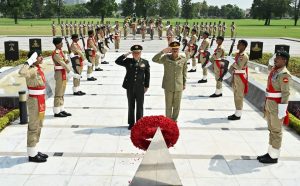On August 26, a visiting Chinese military delegation led by General Li Qiaoming, the commander of the People’s Liberation Army Ground Force, held meetings with Pakistani Prime Minister Shehbaz Sharif, Defense Minister Khawaja Asif, and Army Chief General Asim Munir. The delegation also laid down a floral wreath at the Yadgar-e-Shuhada, a memorial to honor fallen soldiers.
While these meetings were going on, Pakistan’s Balochistan Province, where strategically important Gwadar Port is located, experienced a devastating wave of terrorism. The Balochistan Liberation Army (BLA), which is fighting for the province’s independence, conducted coordinated attacks on security personnel, highways, rail tracks, and laborers hailing from other provinces. These attacks killed at least 73 people. While the BLA has been active since its formation in 2006, these specific attacks were the most severe in magnitude.
Notably, August 26 marked the 18th anniversary of Nawab Akbar Bugti. A Pakistani politician, Baloch nationalist, and head of the Bugti tribe, Bugti met a tragic end on this day in 2006. On the orders of General Pervez Musharraf, the military raided Bugti’s hideout in a cave, which subsequently collapsed, resulting in the deaths of Bugti, his guards, and some army personnel.
The insurgency in Balochistan has been ongoing since Pakistan’s early days. Balochistan, which is rich in natural resources but remains Pakistan’s least developed province, has long-standing grievances with the central government and, indeed, with the Pakistani military and security agencies. The grievances of the Balochs include abductions of activists, forced disappearances, cultural intrusion, underrepresentation, inequitable resource distribution, and systematic discrimination.
The fifth round of the insurgency in Balochistan, which is still ongoing, can be traced back to the events surrounding Bugti’s death.
On January 2, 2005, a female doctor, Shazia Khalid, was allegedly raped by unidentified individuals within the highly guarded Pakistan Petroleum Limited (PPL) hospital facility in Sui, Dera Bugti, Balochistan. In conflicting accounts, Balochs accused a Pakistani Army officer of being the culprit, while the military dismissed the entire case as a fabricated attempt to damage the institution’s reputation.
In a staunchly traditional Baloch tribe, an incident such as the rape of a woman could invoke a far more severe reaction than any material damage. Akbar Bugti saw the incident as an affront to the honor of the Baloch people and vowed to take revenge. This led him and his supporters into a dangerous confrontation with the Pakistani Army, resulting in his death. The military returned Bugti’s body in a locked casket, preventing his family from both seeing his body and attending his quiet burial. His death enraged pro-freedom separatists.
The fifth wave of insurgency started almost parallel with China’s footprint in Balochistan, especially the completion of Gwadar Port (2002-2006).
China came into the crossfire inadvertently. In practice, Baloch separatists do not have any direct issues with China. However, owing to the perception of China’s affiliation with the Pakistani military, Baloch separatists termed Gwadar and Saindak as China’s neocolonial projects. By extension, Chinese workers in Pakistan became victims of Baloch separatist attacks. In addition, given the significance of Pakistan’s relations with China, targeting China brings quick attention to the Baloch insurgency in the international limelight.
In 2007, a year after Bugti’s assassination, a confrontation between the military and religious extremists from the Red Mosque (Lal Masjid) once again brought China into Pakistan’s domestic quagmire. Students from the Red Mosque started imposing their own moral rules in the capital, Islamabad. They attacked a Chinese-operated massage parlor, accusing it of being a brothel, and kidnapped masseuses. China demanded that General Pervez Musharraf’s military government protect its citizens, and Pakistan’s haphazard operation to free the mosque from radical students was reportedly conducted at the request of China.
This led Islamist militants to include China as one of their targets. Two weeks later three Chinese were killed in Peshawar. The situation in Xinjiang, a Chinese region where the native Muslim population faced oppression and restrictions on religious expression, gave religious extremists further opportunities to exploit anti-China sentiments. It was in this context that certain transnational militant groups issued threats against China.
Despite very different motives, recent reports indicate that Baloch separatists and religious extremist groups have tacitly aligned with each other. Their targeting of Chinese projects and nationals is one of the points they have in common.
Pakistan claimed the March 2024 suicide bombing that killed five Chinese engineers and their local driver was carried out by the Tehreek-e-Taliban Pakistan, a religious extremist group with sanctuaries on the Afghanistan-Pakistan border. Also in March 2024, the BLA attacked Gwadar Port Authority Complex, killing two Pakistani soldiers, and Turbat naval base in Balochistan, killing one Pakistani soldier. In both attacks, the BLA said it was fighting against China’s presence in the Baloch homeland.
Although Chinese interests were unhurt on August 26, the parallel visit of the Chinese military delegation and its appearance with Pakistani military officials on the very day of Bugti’s death anniversary could perpetuate the perception that China backs the policies of the Pakistani military. While Pakistani national broadcasts censored mention of the incidents, Li’s delegation would have watched BLA’s direct threats to China and the carnage through international media while staying in Pakistan.
Who would have arranged the date for this visit? Bugti’s killing is related to Pakistan’s domestic politics and the sensitive timing is unlikely to have been noticed by China. The visit would have been organized by the Pakistani military. Whether it was intentionally done as a show of power or unwisely overlooked, the choice of this date for the top military leadership of both countries to stand side by side was poorly thought out. Furthermore, the failure of Pakistani intelligence agencies to detect the largest and most coordinated attacks by the BLA so far compounded the damage.
Sometimes, impressions carry more weight than actions. Dragging China into the quagmire of militancy and terrorism, for which the Pakistani military bears great responsibility, should have been avoided by inviting the Chinese military delegation on a different date.

































